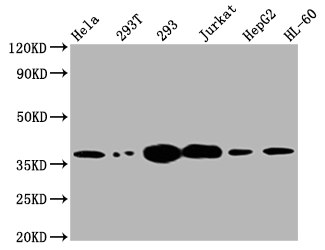The TYMS monoclonal antibody was produced through the immunization of animals with a synthesized peptide derived from human TYMS. B cells were isolated and fused with myeloma cells to generate hybridomas. The variable light and variable heavy domains of the TYMS antibody-producing hybridomas were then sequenced, and the TYMS monoclonal antibody gene was cloned into a vector. The recombinant vector was transfected into cells for cultivation, and the resulting TYMS recombinant monoclonal antibody was purified using affinity chromatography from the cell culture supernatant. This highly specific TYMS recombinant monoclonal antibody has been tested and validated for use in ELISA and WB applications and can react with human TYMS samples.
The TYMS protein plays a critical role in DNA synthesis by catalyzing the conversion of deoxyuridine monophosphate (dUMP) to deoxythymidine monophosphate (dTMP) in the presence of a methyl group donor, 5,10-methylenetetrahydrofolate. This reaction is essential for the production of the nucleotide thymidine, which is a key component of DNA. TYMS is therefore a crucial enzyme in the synthesis of new DNA molecules during cell division and replication.






